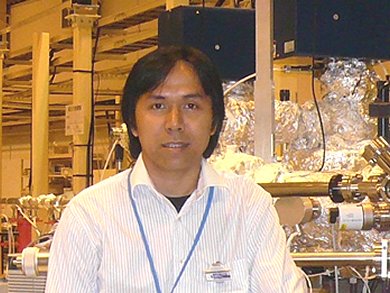The Wiley-Chemical Society of Thailand Award for Contributions to Green Chemistry will be awarded to Dr. Kajornsak Faungnawakij, National Nanotechnology Center, National Science and Technology Development Agency, Thailand.
Dr. Faungnawakij receives the prize for his work on the development of eggshell-based super basic catalysts for biodiesel production and nanostructured metal phosphates for lignocellulosic biomass conversion.
The award will be presented during the PACCON 2013 meeting held at Bangsaen, Chon Buri, Thailand, from 23–25 January 2013. The PACCON 2013 was organized by Burapha University and the Chemical Society of Thailand, with the theme focusing on “Global Chemical Sciences for Green Community”. At the conference, Dr. Kajornsak Faungnawakij will present a prize lecture entitled “Green Nanotechnology for Green Biorefinery”.
Kajornsak Faungnawakij received his Bachelor’s degree in Chemical Engineering from Prince of Songkla University, Thailand. He gained his Ph.D. in Chemical Engineering at Chulalongkorn University under the supervision of Professors Noriaki Sano, Wiwut Tanthapanichakoon, and the late Professor Tatsuo Kanki. From 2005–2007, Faungnawakij worked as a researcher at the Japan Science and Technology Agency (JST) in Kyoto, and did postdoctoral research at the Department of Energy and Hydrocarbon Chemistry, Kyoto University, Japan. Since 2008, he has been a senior researcher at the National Nanotechnology Center (NANOTEC), National Science and Technology Agency, Thailand. In 2009, his research team started the Nanomaterials for Energy and Catalysis Laboratory at NANOTEC to pursue renewable energy research.
Faungnawakij’s research focuses on the syntheses and processing of functional nanomaterials for catalysis in biorefining and petrorefining, in particular, biomass conversion to various products, including biofuels and biochemicals.
To celebrate the achievement of Dr. Kajornsak Faungnawakij, we talked to him to understand his views on green chemistry and how best we can deliver the benefits of chemistry to people around the world.
 How do you feel about winning the Wiley-CST Award for Green Chemistry 2012?
How do you feel about winning the Wiley-CST Award for Green Chemistry 2012?
I feel very excited and honored to receive the Wiley-CST Award for Green Chemistry. First of all, I would like to dedicate this prestigious award to all NANOTEC’s staff, especially to my research team at the Nanomaterials for Energy and Catalysis Laboratory. We are gratified that all the efforts we have put into this area are being recognized. The award will be an active catalyst and encouragement to further drive us to work more towards this green chemistry and green chemical technologies.
How do you think your work in green chemistry will contribute towards a sustainable planet?
I believe that green chemistry will bring us to a green and low-carbon society. People are taking about a sustainable planet while we are now facing a number of serious global issues, such as climate change, lack of food, depletion of fossil-based energy and chemicals. I hope that, not only my work, but the current movement in nanocatalysis research and development for biorefining – or in other words, the conversion of renewables to bioproducts, including biofuels and biochemicals – will help slow down, mitigate, and even provide a better, alternative solution to such crises.
How can we best deliver the benefits of chemistry to people around the world?
Demonstrating how chemistry works is an important step to making people realize the benefits of chemistry. On the one hand, we love to start from blue sky and frontier research. On the other hand, starting with the end in mind – what and where our research findings would be applicable – would help us see a complete and panoramic jigsaw. Teaming up chemists with engineers, business developers, and potential users/customers would best deliver the benefits to the society.
Thank you for taking the time to talk to us.
Selected publications by Kajornsak Faungnawakij:
- Sr–Mg Mixed Oxides as Biodiesel Production Catalysts,
Kajornsak Faungnawakij, Boonyawan Yoosuk, Supawadee Namuangruk, Pawnprapa Krasae, Nawin Viriya-empikul, Buppa Puttasawat,
ChemCatChem 2012, 4(2), 209–216.
DOI: 10.1002/cctc.201100346 - Conversion of fructose, glucose, and cellulose to 5-hydroxymethylfurfural by alkaline earth phosphate catalysts in hot compressed water,
Pornlada Daorattanachai, Pongtanawat Khemthong, Nawin Viriya-empikul, Navadol Laosiripojana, Kajornsak Faungnawakij,
Carbohydr. Res. 2012, 363, 58–61.
DOI: 10.1016/j.carres.2012.09.022 - Copper phosphate nanostructures catalyze dehydration of fructose to 5-hydroxymethylfufural,
Pongtanawat Khemthong, Pornlada Daorattanachai, Navadol Laosiripojana, Kajornsak Faungnawakij,
Catal. Commun. 2012, 29, 96–100.
DOI: 10.1016/j.catcom.2012.09.025 - Waste shells of mollusk and egg as biodiesel production catalysts,
N. Viriya-empikul, P. Krasae, B. Puttasawat, B. Yoosuk, N. Chollacoop, K. Faungnawakij,
Bioresour. Technol. 2010, 101(10), 3765–3767.
DOI: 10.1016/j.biortech.2009.12.079 - Effect of Thermal Treatment on Activity and Durability of CuFe2O4–Al2O3 Composite Catalysts for Steam Reforming of Dimethyl Ether,
Kajornsak Faungnawakij, Ryuji Kikuchi, Naohiro Shimoda, Tetsuya Fukunaga, Koichi Eguchi,
Angew. Chem. Int. Ed. 2008, 47(48), 9314–9317.
DOI: 10.1002/anie.200802809





What willl be the cost of catalyst? What is its composition?
congratulation too Dr.and his team…very valuable work..